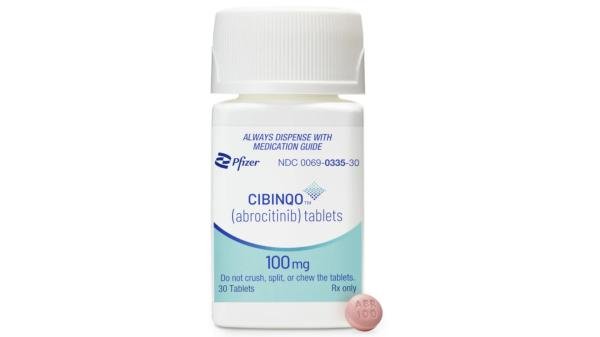Cibinqo and Alcohol/Food Interactions
There is 1 alcohol/food/lifestyle interaction with Cibinqo (abrocitinib).
Abrocitinib Food/Lifestyle
Moderate Food Interaction
MONITOR: Smoking during treatment with abrocitinib may increase the risk of major adverse cardiovascular events (MACE) and the risk of developing malignancies. During abrocitinib clinical studies, current or past smokers had an additional increased risk of overall malignancies. Also, abrocitinib may increase patients' risk of MACE, including myocardial infarction, stroke, and cardiovascular death.
Administration of abrocitinib with high-fat, high-calorie food increased abrocitinib peak plasma concentration (Cmax) and systemic exposure (AUC) by 29% and 26%, respectively, and prolonged the time to reach Cmax by 2 hours. These changes are not considered clinically relevant.
MANAGEMENT: Caution is advised if abrocitinib is prescribed to current or past smokers. Patients should be informed about the symptoms of serious cardiovascular events and the steps to take if they occur. The manufacturer recommends discontinuing abrocitinib in patients that have experienced a myocardial infarction or stroke. Abrocitinib may be taken with or without food.
References (1)
- (2022) "Product Information. Cibinqo (abrocitinib)." Pfizer U.S. Pharmaceuticals Group
Switch to consumer interaction data
Cibinqo drug interactions
There are 588 drug interactions with Cibinqo (abrocitinib).
Cibinqo disease interactions
There are 6 disease interactions with Cibinqo (abrocitinib) which include:
- cardiovascular disease
- infections
- malignancies
- Abrocitinib -thrombosis
- liver dysfunction
- renal dysfunction
More about Cibinqo (abrocitinib)
- Cibinqo consumer information
- Check interactions
- Compare alternatives
- Pricing & coupons
- Reviews (7)
- Drug images
- Side effects
- Dosage information
- During pregnancy
- FDA approval history
- Drug class: selective immunosuppressants
- Breastfeeding
- En español
Related treatment guides
Drug Interaction Classification
| Highly clinically significant. Avoid combinations; the risk of the interaction outweighs the benefit. | |
| Moderately clinically significant. Usually avoid combinations; use it only under special circumstances. | |
| Minimally clinically significant. Minimize risk; assess risk and consider an alternative drug, take steps to circumvent the interaction risk and/or institute a monitoring plan. | |
| No interaction information available. |
See also:
Further information
Always consult your healthcare provider to ensure the information displayed on this page applies to your personal circumstances.


